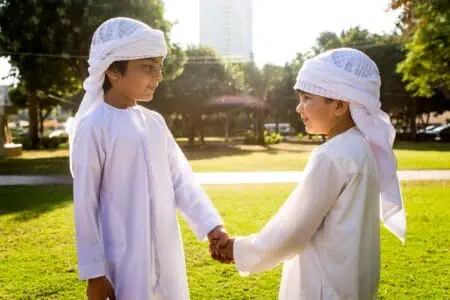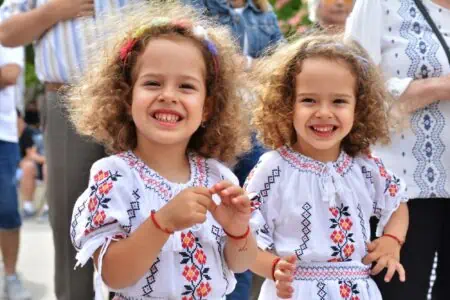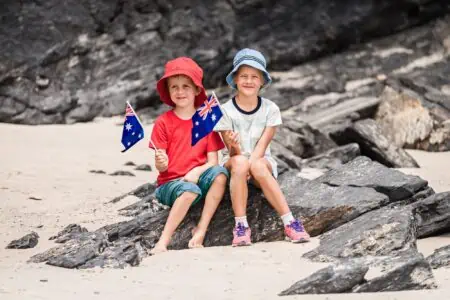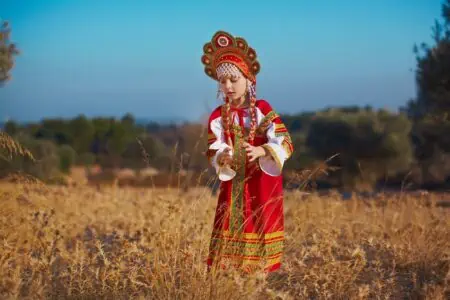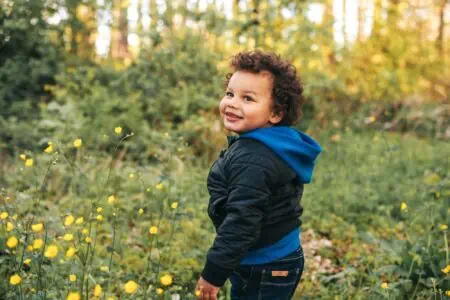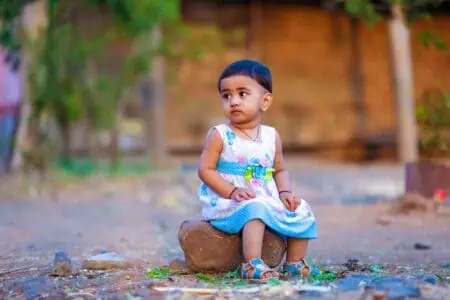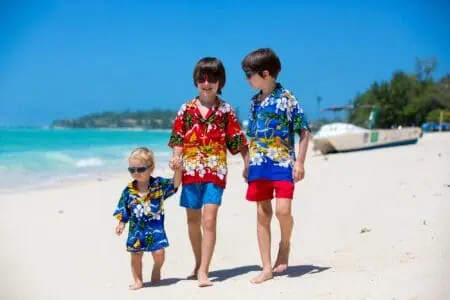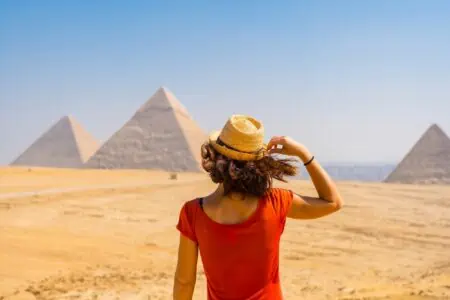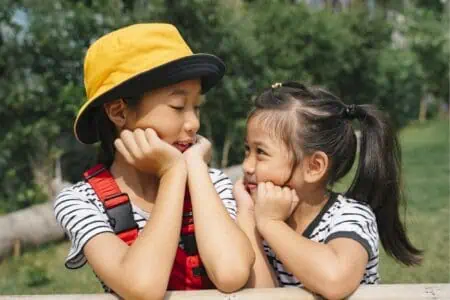The African continent is one of the most diverse places on earth. From Egypt and Kenya to South Africa, African last names are just as varied as their cultures and peoples. There’s a great deal to learn while trying to keep organized.
Ahead is a list including 100 unique African last names that each tell a fascinating story. Discover where cultures come together with the many variations, meanings, and pronunciations of African surnames. You’ll feel like you’ve traveled halfway around the globe without ever leaving home!
100 Popular African Last Names
Travel the world to bring to light all kinds of meaningful African last names with spirit.
Ababio
Ababio means “child that keeps coming” in Ghana, but is better known as a given name. It refers to a child born into a family with many children.
- Origin: African, Ghanaian
- Meaning: Child that keeps coming
- Pronunciation: AHB-aa-Biy-oh
- Variations: Ababiy
- Namesakes: Joyce Ababio, a Ghanaian fashion designer and founder of JACCD Design Institute Africa. Edward Ababio, a Ghanaian-American soccer player for the Colorado Rapids.
- Popularity: Ababio is rare worldwide and mostly used in Ghana, where it ranked 195th in 2014.
Abdullahi
Abdullahi comes from Abdullah, from the Arabic “abd Allah,” meaning “servant of God.” It’s also the name of the prophet Muhammad’s father and is most common in Nigeria, Saudi Arabia, Somalia, and Ethiopia.
- Origin: African, Arabic
- Meaning: God’s servant
- Pronunciation: Aeb-duw-LAA-HHiy
- Variations: Abdollahi, Abdillahi
- Namesakes: Hassan Abdillahi, a Somali journalist who founded Ogaal Radio. Sadiq Abdullahi, a Nigerian tennis player who competed at the 1988 Summer Olympics.
- Popularity: Abdullahi ranked 175th worldwide and is mainly used in Nigeria, ranking 4th in 2014.
Abimbola
Abimbola is a Nigerian surname and first name, meaning “born with wealth.” It’s made up of the Nigerian “abí,” meaning “a being,” “mbę̀,” meaning “to be,” and “ǫlà,” meaning “riches.” As a given name, Abimbola uses the nickname Bola.
- Origin: African, Nigerian-Yoruba
- Meaning: Born with wealth
- Pronunciation: Ah-BIHM-bow-Laa
- Namesakes: Bola Abimbola, a Nigerian musician first known for the album Silifa Bamijo (1987). Wán̄dé Abím̄bọ́lá, the majority leader of the Senate of the Federal Republic of Nigeria from 1992 to 1998.
- Popularity: Abimbola is rare worldwide and primarily used in Nigeria, where it ranked 927th in 2014.
Abioye
Abioye is a variation of Abiola, meaning “son of royalty.” It’s composed of the Nigerian-Yoruba “abí,” meaning “existence,” and “òyè,” meaning “title of honor.” Abioye is one of many Nigerian-African family names focusing on royalty.
- Origin: African, Nigerian-Yoruba
- Meaning: Born into royalty
- Pronunciation: AA-bee-OH-yay
- Namesakes: Abiodun Abioye, a Nigerian cricketer who competed at the 2018 Africa T20 Cup. David Abioye, the Nigerian Vice President of the Living Faith Church Worldwide.
- Popularity: Abioye is rare worldwide and primarily used in Nigeria, ranking 700th in 2014.
Acheampong
Acheampong has many meanings, including “one who brings forth the king.” It’s a Ghanaian surname found in the Ashanti clan. The Ashanti are an ethnic group from the Ashanti region of modern-day Ghana.
- Origin: African, Ghanaian
- Meaning: Destined for greatness
- Pronunciation: Ah-CHEUM-pong
- Namesakes: Ignatius Kutu Acheampong, the head of state of Ghana from 1972 to 1978. Gemma Acheampong, a Ghanaian-American sprinter and silver medalist at the 2016 Summer Olympics.
- Popularity: Acheampong is rare worldwide and mainly used in Ghana, where it ranked 24th in 2014.
Adebayo
Adebayo means “he came in a joyful time” or “greatness or nobility enjoined with joy.” More simply, Adebayo means “he was happy,” which is why it’s also a Nigerian boy’s name.
- Origin: African, Nigerian-Yoruba
- Meaning: Crown meets joy
- Pronunciation: Ah-deh-BAY-Yoh
- Variations: Adebayor
- Namesakes: Ayọ̀bámi Adébáyọ̀, a Nigerian writer awarded The Future Awards Africa Prize for Arts and Culture in 2017. Whitney Adebayo, an English TV personality appearing on the series Love Island.
- Popularity: Adebayo ranked 1,305th worldwide and is mainly used in Nigeria, ranking 49th in 2014.
Adebisi
In Nigeria, Adebisi means “the crown or royalty has produced more.” It also means “multiple crowns” and “the king,” so it sticks to its royal themes.
- Origin: African, Nigerian-Yoruba
- Meaning: Multiple crowns
- Pronunciation: AA-deh-Biy-see
- Namesakes: Mola Adebisi, a German TV presenter on the music television channel VIVA Germany. Ade Adebisi, a rugby league footballer for the London Broncos.
- Popularity: Adebisi is rare worldwide and primarily used in Nigeria, ranking 241st in 2014.
Adekunle
Adekunle means “the crown or royalty fills up the (family) house.” In the Nigerian-Yoruba group, there are many with “ade” names, denoting royal ancestry in their lineage.
- Origin: African, Nigerian-Yoruba
- Meaning: Royalty fills the family house
- Pronunciation: Ah-dey-KOON-Laey
- Namesakes: Benjamin Adekunle, a Nigerian army commander from 1967 to 1969. Prince Adekunle, a Nigerian Jùjú musician and member of the Western Brothers band.
- Popularity: Adekunle is rare worldwide and mostly used in Nigeria, where it ranked 175th in 2014.
Adisa
Adisa is a surname, plus a sometimes used female form of the male Adis. It refers to a “clear-spoken” person and means “ordered” in Sanskrit.
- Origin: African, Nigerian-Yoruba
- Meaning: The clear one
- Pronunciation: Ah-DEES-aa
- Namesakes: Adisa Fatai, a Nigerian footballer for Al-Oruba. Lawrence Adisa, an American actor known for the series New York Undercover.
- Popularity: Adisa is rare worldwide and primarily used in Nigeria, where it ranked 435th in 2014.
Afia
While meaning “heath” in Arabic, Afia means “fire” in Morocco. It comes from Kwaofida, meaning “Lord of life’s home day,” and is also a Ghanaian-Akan girl’s name, meaning “born on Friday.”
- Origin: African, Moroccan
- Meaning: Fire
- Pronunciation: Ah-FEE-aa
- Variations: El Afia
- Namesakes: Moshik Afia, an Israeli singer known for the Mizrahi or Eastern Mediterranean style of music. Nura Afia, an American beauty vlogger and CoverGirl’s first brand ambassador who wears a hijab.
- Popularity: Afia is rare worldwide and mostly used in Bangladesh, ranking 1,885th in 2014.
Akinjide
Akinjide has similar meanings, from “the warrior who comes” to “the strong one has returned.” It’s one of many African last names on our list from Nigeria with origins specific to their culture.
- Origin: African, Nigerian-Yoruba
- Meaning: The warrior who comes
- Pronunciation: AHK-ihn-Jih-deh
- Namesakes: Richard Akinjide, the Nigerian Minister of Education in the First Republic.
- Popularity: Akinjide is very rare worldwide and mainly used in Nigeria.
Aku
Aku means “wealth” in Nigeria but also relates to the Ashanti Wukuo, meaning “born on Wednesday.” Aku, Nigeria, is located in the Enugu State, while Akus is a Gambian ethnic group from Sierra Leone in the 19th-century. It’s also a Scandinavian given name meaning “moon god” and “venerable.”
- Origin: African, Ashanti
- Meaning: Wealth
- Pronunciation: Ah-KUW
- Popularity: Aku is rare worldwide, primarily used in Nigeria, and ranked 728th in Papua New Guinea in 2014.
Albaz
Albaz has both Muslim and Jewish North African origins based on the Arabic “bāz,” meaning “falcon.” It also appears as El-Baz, meaning “the falcon or hawk.”
- Origin: African, Arabic
- Meaning: The falcon
- Pronunciation: Ahl-BAAZ
- Variations: Al-Baz
- Popularity: Albaz is rare worldwide and primarily used in Saudi Arabia, ranking 1,329th in 2014.
Anotidaishe
Anotidaishe originated with the Shona people of Zimbabwe, meaning “the Lord loves us.” It only has statistics as a first name and means “God is our love.”
- Origin: African, Zimbabwean-Shona
- Meaning: The Lord loves us
- Pronunciation: AHN-oh-tiy-DAEY-sheh
Babangida
Babangida is an example of a long African surname taken from the Nigerian root “baba,” meaning “father.” It refers to the master of a household in Nigerian-Hausa culture.
- Origin: African, Nigerian-Hausa
- Meaning: House ruler
- Pronunciation: Baa-baan-GIY-dah
- Namesakes: Ibrahim Babangida, the military president of Nigeria from 1985 to 1993. Haruna Babangida, a Nigerian footballer for Barcelona.
- Popularity: Babangida is rare worldwide and mainly used in Nigeria, where it ranked 253rd in 2014.
Babatunde
Babatunde means “’father has returned” in the Nigerian-Yoruba language. It’s traditionally used when a baby is born after the death of a father or grandfather. Babatunde consists of the Yoruba “baba,” meaning “father,” and “tunde,” meaning “returns.”
- Origin: African, Nigerian-Yoruba
- Meaning: Father returns
- Pronunciation: BAH-buh-TOON-day
- Variations: Tunde
- Namesakes: Obba Babatundé, an American actor appearing in The Notebook. Babajide Collins Babatunde, a Nigerian footballer for FC Ebedei.
- Popularity: Babatunde is rare worldwide and primarily used in Nigeria, ranking 157th in 2014.
Babette
Babette is super rare, best known as a form of Barbara for girls. It may have come into being because of French colonialism in parts of Africa.
- Origin: African, French
- Meaning: God is my oath
- Pronunciation: Baa-BEHT
- Popularity: Babette is extremely rare worldwide, with 29 known occurrences in 2014, mostly in Israel.
Banty
Banty’s meaning is unknown but may refer to Bantu, a language family spoken by over 400 African ethnic groups. Banty is also a word meaning “short or small.”
- Origin: West African
- Meaning: Unknown
- Pronunciation: BAAN-tee
- Variations: Bantu
- Popularity: Banty is very rare worldwide and mainly used in the Ivory Coast, where it’s slightly uncommon.
Boro
Boro refers to the Boro people initially found in Indonesia, from “bod,” the ancient name used for Tibet. Boró is also a Hungarian surname based on Barnabás, a form of the first name Barnaby.
- Origin: African, Tibetan
- Meaning: Boro people
- Pronunciation: BOHR-oh
- Variations: Baro
- Namesakes: Jamuna Boro, an Indian boxer and bronze medalist at the 2019 AIBA Women’s World Boxing Championships. Durga Boro, an Indian footballer for the Mumbai Tigers.
- Popularity: Boro ranked 1,014th worldwide and is primarily used in India, ranking 162nd in 2014.
Boujettif
Boujettif means “the family of the son of the clever head” in the original Arabic. It’s composed of “bou,” meaning “son of,” and “ji’f,” meaning “clever,” head,” or “brain.”
- Origin: African, Arabic
- Meaning: One possesses a clever head
- Pronunciation: BUW-jeh-Teef
- Popularity: Boujettif is extremely rare worldwide, with just five known occurrences in 2014, in England.
Buhle
Buhle is associated with the African Ndebele and Zulu languages and means “beauty” or “goodness.” It’s used as a first name by Zimbabweans and South Africans. In South Africa, the “h” is pronounced with the tongue at the top of the mouth (behind the teeth). As you say the “h” in Buhle, pull the tongue down while sucking air for the most accurate pronunciation. The German version of Buhle means “beloved” and is a variation of Bühler.
- Origin: African, Zulu
- Meaning: Beauty
- Pronunciation: BUU-hhle
- Variations: Buhl
- Namesakes: Paul Buhle, an American writer and founding editor of the journal Radical America (1967 to 1999). Kathleen Buhle, an American writer of If We Break: A Memoir of Marriage, Addiction, and Healing (2022).
- Popularity: Buhle is very rare worldwide.
Ceesay
Ceesay originally appeared in Mali but is common in West Africa. Those named Ceesay were said to be descended from Marabout, a West African Muslim teacher. It’s also a variation of Cissé, meaning “horse rider,” from the Soninke clan of the Ghanaian Empire.
- Origin: African, Gambian
- Meaning: Horse rider
- Pronunciation: SIY-Seay
- Variations: Cisse
- Namesakes: Madi Ceesay, a Gambian journalist and president of the Gambia Press Union. Jatto Ceesay, a Gambian footballer for Al-Hilal.
- Popularity: Ceesay is rare worldwide and mainly used in Gambia, where it ranked 2nd in 2014.
Chedjou
Chedjou’s meaning is unknown, but its origin is Cameroonian. The typical naming tradition in Cameroon had surnames first only given to one person. After a few generations, they have become the last names to be passed on.
- Origin: African, Cameroonian
- Meaning: Unknown
- Pronunciation: SHEH-Joo
- Namesakes: Aurélien Chedjou, a Cameroonian footballer for Bursaspor.
- Popularity: Chedjou is very rare worldwide and primarily used in Cameroon, ranking 1,160th in 2014.
Chiamaka
Chiamaka is made up of the Nigerian “chi,” meaning “God,” and “amaka,” meaning “very good.” It also means “God is beautiful” and “the right spirit” in Nigerian Igbo culture.
- Origin: African, Nigerian-Igbo
- Meaning: God is more beautiful
- Pronunciation: Chea-MAEK-aa
- Popularity: Chiamaka is extremely rare worldwide, with 254 known occurrences in 2014, mostly in Nigeria.
Chidozie
Chidozie’s meanings vary around the idea of divine protection. It means both “may God fix it” and “make it good for me” or “God has repaired.” As a first name, Chidozie’s nickname is often Dozie.
- Origin: African, Nigerian-Igbo
- Meaning: God will perfect me
- Pronunciation: Chih-DOH-zee
- Variations: Chidozie
- Popularity: Chidozie is very rare worldwide and mainly used in Nigeria.
Chike
Chike means “talented” and “strength” In Nigeria. In Egypt, it means “power of God,” which is similar to another Nigerian meaning of “God’s strength.”
- Origin: African, Nigerian-Igbo
- Meaning: Talented
- Pronunciation: CHEE-keh
- Popularity: Chike is rare worldwide and primarily used in Nigeria, where it ranked 1,918th in 2014.
Chizimu
Chizimu is one of only a couple of Malawian-African last names. Malawi is in East Africa and is known for the Lambya tribe from near the Tanzanian border. Chizimu’s meaning is unknown and isn’t found much outside of Malawi.
- Origin: African, Malawian
- Meaning: Unknown
- Pronunciation: CHIH-zih-Muw
- Popularity: Chizimu is very rare worldwide and primarily used in Malawi.
Chukwunyelu
Chukwunyelu is the long form of the Nigerian first name Chukwu, itself short for other names like Nwachukwu. The Nigerian-Igbo people often hold a “naming ceremony called “Igu Afa” when children are born.
- Origin: African, Nigerian-Igbo
- Meaning: God given
- Pronunciation: CHUHK-wuhn-YEH-Loh
- Variations: Chukwu
- Popularity: Chukwunyelu is extremely rare worldwide, with 159 known occurrences in 2014, mainly in Nigeria.
Coulibaly
Coulibaly is West African and is mostly found in Mali, the Ivory Coast, and Burkina Faso. It’s the name for the Bambara clan and is composed of “kulu,” meaning “band of infantry,” and “bali,” meaning “to defend.” Coulibaly also means “men without boats.”
- Origin: African, Malian
- Meaning: Clan name
- Pronunciation: COO-lih-Baa-lee
- Namesakes: Bilal Coulibaly, a French basketball player for the Washington Wizards. Fatoumata Coulibaly, a Malian actress known for N’Golo dit Papa (1997).
- Popularity: Coulibaly ranked 264th worldwide and is primarily used in Mali, ranking 2nd in 2014.
Dinka
Dinka means “people” in Ethiopia and refers to the Nilotic tribe in South Sudan. It also means “it is not finished” and “we are not finished.”
- Origin: African, Ethiopian
- Meaning: People
- Pronunciation: DIHN-kaa
- Popularity: Dinka is rare worldwide and mostly used in Ethiopia, where it ranked 1,955th in 2014.
Dogo
Dogo originates in the African-Swahili language, meaning “little.” It’s used as a surname and a nickname and can mean “someone who is humble to God” in Akan. Dogo is quite common in Ghana and is the name for several locations in Mali and Niger.
- Origin: African, Swahili
- Meaning: Little
- Pronunciation: DOH-Gow
- Namesakes: Raymond Takyi (known as Paa Dogo), a Ghanaian musician known for the song Osumafour (Mmonto).
- Popularity: Dogo is rare worldwide, mainly used in Nigeria, and ranked 82nd in Togo in 2014.
Domrane
Domrane’s meaning is unclear, but it comes from the Kabyle ethnic group based in parts of northern Algeria. It’s very rare but appears in Algiers and France, where over half a million Algerians lived in 2019.
- Origin: African, Algerian
- Meaning: Unknown
- Pronunciation: DOHM-raeyn
- Popularity: Domrane is extremely rare worldwide, with 171 known occurrences in 2014, primarily in Algeria.
Egebe
Egebe means “kite” in the Congo, where it’s a surname and nickname. It may relate to the Nigerian Egbe, which means “kite” in Yoruba.
- Origin: African, Congolese
- Meaning: Kite
- Pronunciation: Eh-GEH-bey
- Variations: Egbe
- Popularity: Egebe is very rare worldwide and primarily used in the DR Congo.
Elmalik
El Malik also appears as the Arabic “al-Malik,” meaning “the king” or “king of kings.” It’s one of 99 names for God in Islam. Elmalik also has a root similar to the Turkish “elma,” meaning “apple.”
- Origin: African, Sudanese
- Meaning: The king
- Pronunciation: Ehl-MAA-lihk
- Variations: El Malik
- Popularity: Elmalik is rare worldwide and mainly used in Sudan, ranking 416th in 2014.
Emem
Emem means “signifies peace” and “person of peace.” It’s mostly used as a first name for girls in western Africa and is also the name of a language in Indonesia.
- Origin: African, Nigerian-Igbo
- Meaning: Peace
- Pronunciation: EH-mem
- Popularity: Emem is rare worldwide and primarily used in Nigeria, where it’s slightly uncommon.
Ezekwesili
Ezekwesili’s meaning is unknown and hardly appears outside of Nigeria. Oby Ezekwesili is the only famous namesake for this typical Nigerian surname.
- Origin: African, Nigerian
- Meaning: Unknown
- Pronunciation: EH-Zeh-kwe-SIHL-ee
- Namesakes: Oby Ezekwesili, the Federal Minister of Education in Nigeria from 2006 to 2007.
- Popularity: Ezekwesili is very rare worldwide and mostly used in Nigeria.
Fakhoury
Fakhoury is based on the Arabic “fakhour,” meaning “proud.” It can also appear as Al-Fakhoury or El-Fakhoury. In Africa, Fakhoury appears in Egypt with those who once lived in Rachaya Al Foukhar, Lebanon.
- Origin: African, Arabic
- Meaning: Proud
- Pronunciation: Faak-HOWR-ee
- Variations: Fakhouri
- Namesakes: Pierre Fakhoury, a Lebanese/Ivorian architect whose work includes the Palais du bord de mer in Gabon. Dina Fakhoury, an American actress appearing in The Cut (2014).
- Popularity: Fakhoury is very rare worldwide and mainly used in Jordan, ranking 249th in 2014.
Falade
Falade’s very specific meaning is “he who owns the oracle, owns the crown.” In Nigerian-Yoruba, it also means “god of divination has intermingled with royalty.”
- Origin: African, Nigerian-Yoruba
- Meaning: He who owns the oracle owns the crown
- Pronunciation: Faa-LAAHD
- Popularity: Falade is rare worldwide, primarily used in Nigeria, and ranked 768th in Benin in 2014.
Falana
Falana’s meaning is unknown in Nigeria, but some believe it means “minder of another’s business” from “ifalana.” Others link it to Nigerian last names using “ifa,” meaning “deity of wisdom.”
- Origin: African, Nigerian-Yoruba
- Meaning: Unknown
- Pronunciation: Faa-LAA-nah
- Variations: Fallana
- Namesakes: Funmi Falana, a Nigerian women’s rights activist and the National Director of Women Empowerment and Legal Aid. Lola Falana, an American singer known for My Baby in 1965.
- Popularity: Falana is rare worldwide and primarily used in Nigeria, where it ranked 1,250th in 2014.
Faraji
Faraji has both Swahili and Persian origins as a form of the Arabic Haraj. It means “one who consoles or comforts.” Faraji was once a typical name used for royal advisors and their descendants.
- Origin: African, Swahili
- Meaning: One who comforts
- Pronunciation: Faa-RAA-jhee
- Variations: Faraj
- Namesakes: Farshad Faraji, an Iranian footballer for the Iranian national team.
- Popularity: Faraji is rare worldwide and mainly used in Iran, ranking 114th in 2014.
Fifi
Fifi is quite rare as a surname but is known as a Ghanaian boy’s name, meaning “born on a Friday.” It’s also recognizable as a nickname for the French Josephine. Fifi is also a town located in Tanger-Tetouan-Al Hoceima, Morocco.
- Origin: African, Ghanaian
- Meaning: Born on a Friday
- Pronunciation: FEE-fee
- Popularity: Fifi is rare worldwide and primarily used in Morocco, where it’s slightly uncommon.
Gbeho
Gbeho refers to a strong “leader” and “visionary” and is of Ghanaian-Anlo Ewe origin. The Anlo Ewe people were thought to have arrived in the western part of Ghana from Togo in the later 17th-century.
- Origin: African, Ghanaian
- Meaning: Powerful
- Pronunciation: Beh-HOE
- Popularity: Gbeho is very rare worldwide and mostly used in Ghana.
Gowon
Gowon means “rainmaker” in the Nigerian-Yoruba language. Rainmakers are highly regarded figures in Nigerian culture and use divination to communicate with spirits and ask for rain.
- Origin: African, Nigerian
- Meaning: Rainmaker
- Pronunciation: GOH-wahn
- Variations: Go Won
- Namesakes: Yakubu Gowon, the third head of state of Nigeria1966 to 1975.
- Popularity: Gowon is rare worldwide and mainly used in Nigeria, where it’s slightly uncommon.
Grigahcine
Grigahcine’s meaning is officially unknown but may originate with the Tinisican Kabyle people. The Kabyle are the biggest Berber population in Algeria and the second largest in North Africa.
- Origin: African, Tunisian
- Meaning: Unknown
- Pronunciation: GRIH-gaa-Siyn
- Namesakes: William Grigahcine (known as DJ Snake), a French DJ known for the single Turn Down for What in 2013.
- Popularity: Grigahcine is very rare worldwide and primarily used in Algeria.
Haggar
Haggar relates to the biblical character of Hagar, an Egyptian slave. Its Hebrew meanings are “flight” or “forsaken.”
- Origin: African, Hebrew
- Meaning: Forsaken
- Pronunciation: HAA-Gehr
- Variations: Hagar
- Namesakes: William Haggar, a British filmmaker known for the early short Desperate Poaching Affray (1903).
- Popularity: Haggar is rare worldwide and mostly used in Chad, ranking 92nd in 2014.
Hasan
Hasan derives from the Arabic root “h-s-n,” meaning “handsome,” “excellent,” and “favorable.” It can also mean “benefactor” and is super popular as an Islamic boy’s name.
- Origin: African, Arabic
- Meaning: Good
- Pronunciation: HHaa-SAEN
- Variations: Hassan
- Namesakes: Abd Al Naser Hasan, a Syrian footballer who plays for Naft Al-Janoob. Faizul Hasan, a Bangladeshi member of the East Bengal Legislative Assembly from 1956 to 1962.
- Popularity: Hasan ranked 134th worldwide, is mainly used in Bangladesh, and ranked 42nd in Somalia in 2014.
Husaini
Husaini is based on the Arabic Hussein or Husain, first used by Imam Husain ibn Ali. Those named any variation of Husaini today claim to be descendants of the Islamic prophet Muhammad. Hussaini is also the name of a valley in Pakistan.
- Origin: African, Arabic
- Meaning: Descendent of Hussein
- Pronunciation: Huw-SAA-niy
- Variations: Hussaini, Husayni, Husseini
- Namesakes: Adian Husaini, an Indonesian Islamic scholar and chairman of the Indonesian Islamic Propagation Council.
- Popularity: Husaini is rare worldwide and primarily used in Nigeria, where it ranked 475th in 2014.
Igwe
Igwe is a Nigerian-Igbo surname inspired by the Igbo god of the sky. It relates to Igwebuike, meaning “many are powerful,” and is also a royal title for rulers in Igboland.
- Origin: African, Nigerian-Igbo
- Meaning: Sky
- Pronunciation: IHG-wey
- Namesakes: Chioma Igwe, an American soccer player for the U.S. U-20 women’s national soccer team. Leo Igwe, a Nigerian human rights advocate and representative of the International Humanist and Ethical Union.
- Popularity: Igwe ranked 1,493rd worldwide and is mostly used in Nigeria, ranking 59th in 2014.
Imamu
Imamu is a Swahili name that uses the Arabic “imam.” Imam is used to indicate any kind of spiritual guide in Islam.
- Origin: African, Swahili
- Meaning: Spiritual leader
- Pronunciation: Ih-MAA-muw
- Variations: Imam
- Popularity: Imamu is rare worldwide and mainly used in Nigeria.
Izem
Izem means “lion” in the Tanzanian-Amazigh language. Tanzania’s language is also called Tamazight and is used by many Berber communities in North Africa.
- Origin: African, Tanzanian
- Meaning: Lion
- Pronunciation: IH-zehm
- Variations: Isem
- Namesakes: Lamia Izem, an Algerian team handball player for the Algerian national team.
- Popularity: Izem is rare worldwide, primarily used in Algeria, and ranked 1,572nd in Morocco in 2014.
Jakande
The exact origins of Jakande aren’t clear, but its long meaning is. It means “one who frees the sacrificial animal for the babaláwo.” Jakande is also the present participle of a Swedish verb meaning “to say yes.”
- Origin: African
- Meaning: (One who) frees the sacrificial animal for the babaláwo
- Pronunciation: Jaa-KAAN-deh
- Namesakes: Lateef Jakande, the Nigerian governor of Lagos State from 1979 to 1983.
- Popularity: Jakande is extremely rare worldwide, with 134 known occurrences in 2014, mainly in Nigeria.
Jelani
Jelani means “strong” and “great” in Swahili. It describes “one who is mighty” in the Bible and is more a given name that has found favor with African Americans.
- Origin: African, Swahili
- Meaning: Mighty
- Pronunciation: Jeh-LAA-niy
- Popularity: Jelani is rare worldwide, mainly used in Pakistan, and ranked 736th in Somalia in 2014.
Kalu
Kalu is most common among the Igbo people in east Nigeria. It’s one of several African surnames with origins in mythology and refers to Igbo, the thunder god. As a given name, Kalu is short for Kamanu or Kamalu and means “since the dawn of time” in Arabic.
- Origin: African, Nigerian-Igbo
- Meaning: God of thunder
- Pronunciation: KAA-luw
- Namesakes: Orji Uzor Kalu, the Nigerian governor of Abia State from 1999 to 2007. Joshua Kalu, an American football player for the Washington Commanders.
- Popularity: Kalu is uncommon worldwide and primarily used in Nigeria, where it ranked 119th in 2014.
Kanumba
Very little is known about Kanumba, other than as a Tanzanian name. It appears more for boys who are “born in a small house.”
- Origin: African, Tanzanian
- Meaning: Small house
- Pronunciation: Kaa-NOOM-bah
- Namesakes: Steven Charles Kanumba, a Tanzanian actor known for Dar 2 Lagos (2006).
- Popularity: Kanumba is very rare worldwide and primarily used in Tanzania.
Kanye
Kanye is one of the African family names used by many cultures, from Nigerian Igbo and Swahili to Zulu and Xhosa. In Swahili, it means “only once” and “to shine,” while it means “next in line” in Nigeria. It’s mainly known as a cool first name because of musician Kanye West.
- Origin: African, Swahili
- Meaning: Next in line
- Pronunciation: KAAN-Yeay
- Popularity: Kanye is very rare worldwide and mainly used in Zimbabwe, ranking 1,728th in 2014.
Kenyatta
Kenyatta is best recognized as a Swahili name meaning “jewel.” It’s inspired by the first Kenyan president’s beaded Massai belt.
- Origin: African, Swahili
- Meaning: Jewel
- Pronunciation: Ken-YAA-tah
- Namesakes: Jomo Kenyatta, the Prime Minister of Kenya from 1963 to 1964. Margaret Kenyatta, the First Lady of Kenya from 2013 to 2022.
- Popularity: Kenyatta is rare worldwide and primarily used in Kenya, where it ranked 1,151st in 2014.
Khelif
Khelif is one of the most unique variants of Khalif, meaning “successor” in Arabic. In Islam, Khelif is used as a title for a head of state or Muslim leader.
- Origin: African, Arabic
- Meaning: Successor
- Pronunciation: Keh-LEEF
- Variations: Khelifi
- Namesakes: Imane Khelif, an Algerian boxer and gold medalist at the 2022 African Championships.
- Popularity: Khelif is rare worldwide and mostly used in Algeria, ranking 284th in 2014.
Kimathi
Kimathi originated with the Kenyan Kikuyu language, meaning “earnest provider.” It’s also used for boys and can mean “serious.” Kikuyu is Kenya’s second most popular language, alongside Swahili.
- Origin: African, Kikuyu
- Meaning: Earnest provider
- Pronunciation: Kih-MAE-Thiy
- Variations: Kamathi
- Namesakes: Dedan Kimathi, the Kenyan leader of the Mau Mau Uprising who led the military struggle against the British in the 1950s.
- Popularity: Kimathi is rare worldwide and mainly used in Kenya, where it ranked 135th in 2014.
Ladipo
Ladipo means “wealth and prosperity” in Yoruba. It hardly appears outside of Nigerian culture but is also given to boys as a first name.
- Origin: African, Nigerian-Yoruba
- Meaning: Wealth and prosperity
- Pronunciation: Laa-DEE-poh
- Variations: Oladipo
- Namesakes: Duro Ladipo, a Nigerian playwright known for the play Ọba kò so (The King did not Hang). Sule Ladipo, a Nigerian tennis player who competed at the 1996 Summer Olympics.
- Popularity: Ladipo is very rare worldwide and primarily used in Nigeria.
Lawal
Lawal is associated with the Sadi Arabian surname Awwal. It appears in Nigeria, Niger, and Benin most and is traditionally given to the first of two or more sons in a family, with the Muslim name Muhammad.
- Origin: African, Arabic
- Meaning: The first
- Pronunciation: LAA-wahl
- Namesakes: Gani Lawal, a Nigerian-American basketball player for Trotamundos. Luke Lawal Jr., an American entrepreneur, ranked 96th on The Root’s 100 Black Influencers List.
- Popularity: Lawal ranked 649th worldwide and is mostly used in Nigeria, ranking 19th in 2014.
Mandela
Mandela is a South African-Xhosa name meaning “troublemaker.” It was most famously the surname for Nelson Mandela and is also said to mean “pulling the branch of a tree.”
- Origin: African, Xosa
- Meaning: Troublemaker
- Pronunciation: MAAN-deh-Laa
- Namesakes: Nelson Mandela, the first president of South Africa from 1994 to 1999. Ocansey Mandela, a Burkinabé footballer for Horoya AC.
- Popularity: Mandela is rare worldwide and mainly used in Kenya, ranking 1,196th in 2014.
Masondo
Masondo’s official meaning is unknown, but some say it means “wheels.” It’s quite popular in South Africa but isn’t seen often worldwide.
- Origin: African
- Meaning: Unknown
- Pronunciation: Maa-SAAN-doh
- Namesakes: Amos Masondo, the Chairperson of South Africa’s National Council of Provinces since 2019. David Masondo, a South African singer with the Mbaqanga group The Soul Brothers.
- Popularity: Masondo is rare worldwide and primarily used in South Africa, ranking 222nd in 2014.
Mbarek
Mbarek is one of many variations of Mubarek taken from the Arabic “mubārak.” It means “lucky” and “blessed” and is a popular choice for Islamic boys.
- Origin: African, Arabic
- Meaning: Lucky
- Pronunciation: MM-Baa-rehk
- Variations: M’Barek, Mubarek
- Namesakes: Ammouri M’barek, a Moroccan musician and pioneer of Moroccan Amazigh (Berber) Music. Mabrouka Mbarek, a Tunisian member of the Constituent Assembly of Tunisia.
- Popularity: Mbarek is rare worldwide, mostly used in Morocco, and ranked 209th in Tunisia in 2014.
Mensa
Mensa comes from the Ghanaian-Akan language in West Africa. Its meaning describes the “third born child” to a family. Mensa is an alternative version of Mensah, the most common surname in Ghana.
- Origin: African, Ghanaian
- Meaning: Born third
- Pronunciation: MEHN-saa
- Variations: Mensah
- Namesakes: Lucas Mensa, an Argentine rugby union player for Oyonnax. Vic Mensa, an American rapper and member of the group Kids These Days.
- Popularity: Mensa is rare worldwide and mainly used in Ghana, where it ranked 472nd in 2014.
Mostafa
Mostafa is the Arabic word for a “chosen person” and is one of the names of the Prophet Muhammad. It can also mean “selected,” “appointed,” or “preferred.”
- Origin: African, Arabic
- Meaning: Chosen person
- Pronunciation: Muw-STAA-fah
- Variations: Moustafa, Moustapha, Mustafa, Mustapha
- Namesakes: Amr Mostafa, an Egyptian singer known for the album Ayamy (2007). Hassan Mostafa, an Egyptian footballer for the Egyptian national team.
- Popularity: Mostafa ranked 480th worldwide and is primarily used in Egypt, ranking 8th in 2014.
Musa
Musa represents the Muslim version of Moses, meaning “son.” Among the South African Lozi tribe, Musa also means “mercy” and is a top 10 surname in Nigeria.
- Origin: African, Arabic
- Meaning: Drawn out of the water
- Pronunciation: MOO-Saa
- Namesakes: Balkisu Musa, a Nigerian weightlifter and bronze medalist at the 1999 World Weightlifting Championships. Said Musa, the third prime minister of Belize from 1998 to 2008.
- Popularity: Musa ranked 144th worldwide and is mostly used in Nigeria, where it ranked 2nd in 2014.
Mwanajuma
Mwanajuma is given to a “child born on a Friday” in Swahili. Many African last names are based on first names inspired by the days of the week. One hundred percent of those with the surname Mwanajuma live in East Bantu Africa.
- Origin: African, Swahili
- Meaning: Friday
- Pronunciation: MWAA-nah-Joo-maa
- Variations: Mwenyijuma
- Popularity: Mwanajuma is very rare worldwide and mainly used in Kenya.
Nenge
Nenge means “see” or “to see” in the lesser-known Nigerian-Tiv culture. The Tiv comprise nearly two-and-a-half percent of Nigeria’s population and can also be found in Cameroon.
- Origin: African, Nigerian-Tiv
- Meaning: See
- Pronunciation: NEHNG
- Variations: Nenges
- Popularity: Nenge is very rare worldwide and primarily used in Nigeria.
Ngige
Ngige is considered one of the oldest African surnames that’s also a boy’s name. It means “locust,” but can mean “fence” and “barrier.”
- Origin: African, Kenyan
- Meaning: Locust
- Pronunciation: En-GIH-gee
- Variations: Ngigi
- Namesakes: Chris Ngige, the Minister of Labour and Employment of Nigeria from 2015 to 2023.
- Popularity: Ngige is rare worldwide and mostly used in Kenya, ranking 686th in 2014.
Nnamani
Nnamani is made up of the Nigerian-Igbo “nnam,” meaning “my father” or “my ancestors,” and “ani,” meaning “land.” It means “my father’s land,” but also means “noble man.”
- Origin: African, Nigerian-Igbo
- Meaning: My father’s land
- Pronunciation: Naa-MAAN-iy
- Namesakes: Ken Ugwu Nnamani, the 11th president of the Nigerian Senate from 2005 to 2007. Ogonna Nnamani, an American volleyball player awarded the Honda-Broderick Cup in 2004.
- Popularity: Nnamani is rare worldwide and mainly used in Nigeria, where it ranked 318th in 2014.
Obama
Obama is a Kenyan word meaning “to lean” or “bend over.” It can refer to the “descendant of the bent one,” with an ancestor having bent limbs. Obama is best associated with U.S. President Barack Obama and also means “little beach” in Japanese.
- Origin: African, Kenyan
- Meaning: To bend
- Pronunciation: Ow-BAA-maa
- Variations: Obamma
- Namesakes: Barack Obama, the 44th president of the U.S. from 2009 to 2017. Youssef Obama, an Egyptian footballer for Zamalek.
- Popularity: Obama is rare worldwide, primarily used in Equatorial Guinea, and ranked 349th in Cameroon in 2014.
Obi
Obi means “heart” in Nigeria, along with variations like Obinna, Obidike, and Obioha. An Obi is also a main building within an Igbo home where guests are received.
- Origin: African, Nigerian-Igbo
- Meaning: Heart
- Pronunciation: OH-bee
- Namesakes: Peter Obi, the Nigerian governor of Anambra 2007 to 2014. Jide Obi, a Nigerian musician known for the album Front Page News.
- Popularity: Obi ranked 1,608th worldwide and is mostly used in Nigeria, ranking 66th in 2014.
Okorie
Among Nigerian-Igbo peoples, Okorie refers to “someone born on Orie,” otherwise known as the “market day.” Orie is one of the days of the Igbo week when goods are officially sold at markets.
- Origin: African, Nigerian-Igbo
- Meaning: Born on Orie (market day)
- Pronunciation: Oh-KAOR-iy
- Variations: Okere
- Namesakes: Angela Okorie, a Nigerian actress who won the 2015 City People Entertainment Award for Best Supporting Actress. Ikechukwu Okorie, a Nigerian footballer for Al-Bahri.
- Popularity: Okorie is uncommon worldwide and mainly used in Nigeria, where it ranked 115th in 2014.
Okusanya
Like other Nigerian-African family names, Okusanya’s meaning is symbolic. It means “one gets rewarded for their sufferings” and “the god of wealth has rewarded me for my sufferings.”
- Origin: African, Nigerian-Yoruba
- Meaning: God has rewarded me for my sufferings
- Pronunciation: Oh-kuw-SAAN-yaa
- Popularity: Okusanya is very rare worldwide and primarily used in Nigeria.
Olatunji
Olatunji is based on the Nigerian-Yoruba first name Ọlátúnjí. It’s made up of the phrase “ọlá tún jí,” meaning “nobility has awoken again.” Olatunji evokes the idea of “prestige, success, and wealth reawakened.”
- Origin: African, Nigerian-Yoruba
- Meaning: Wealth awakes again
- Pronunciation: Oh-laa-TUHN-jiy
- Namesakes: Babatunde Olatunji, a Nigerian drummer known for the 1959 album Drums of Passion. Victor Olatunji, a Nigerian footballer for Sparta Prague.
- Popularity: Olatunji is rare worldwide and mostly used in Nigeria, ranking 222nd in 2014.
Olowe
Olowe’s very specific meaning refers to someone “capable of calling many people for help.” Some believe it to be similar to Oluwa, a Yoruba word meaning “lord.”
- Origin: African, Nigerian-Yoruba
- Meaning: One who can call many people for help
- Pronunciation: OH-loh-Wehy
- Popularity: Olowe is rare worldwide and mainly used in Nigeria, where it’s slightly uncommon.
Omenma
Omenma is a Nigerian-Igbo word describing a person “who does good to others.” It’s also used as a nickname for people with many good deeds.
- Origin: African, Nigerian-Igbo
- Meaning: Good doer
- Pronunciation: Oh-MEHM-aa
- Variations: Omenmah
- Popularity: Omenma is very rare worldwide and primarily used in Nigeria.
Orji
Orji is a Nigerian variation of Oji, a first name meaning “iroko tree,” a hardwood found in Africa. It sometimes refers to a “kola nut” seed in the same tree or a village in southeastern Nigeria.
- Origin: African, Nigerian-Igbo
- Meaning: Iroko tree
- Pronunciation: OHR-jhee
- Variations: Oji
- Namesakes: Josephine Orji, a Nigerian powerlifter and gold medalist at the 2016 Summer Paralympics. Theodore Orji, the governor of Abia State from 2007 to 2015.
- Popularity: Orji is rare worldwide and mostly used in Nigeria, ranking 123rd in 2014.
Oyekan
Oyekan is one of many Nigerian-Yoruba surnames surrounding royalty. It describes the “next to be crowned” in a family or clan.
- Origin: African, Nigerian-Yoruba
- Meaning: Next to be crowned
- Pronunciation: Oh-yeh-KAAN
- Variations: Oyekanmi
- Namesakes: Adeyinka Oyekan II, the Nigerian Oba (ruler) of Lagos from 1965 to 2003. Lawson Oyekan, a Nigerian-English sculptor and first recipient of the Grand Prix Award for the 2001 1st World Ceramic Biennale.
- Popularity: Oyekan is rare worldwide and primarily used in Nigeria, where it’s slightly uncommon.
Oyewole
Oyewole means “royalty has come in the house” and includes “oye,” often used as an honorary title. It’s composed of the Nigerian-Yoruba phrase “Noyè wọ ilé,” meaning “new member (of a chieftain family) enters the home.”
- Origin: African, Nigerian-Yoruba
- Meaning: Royalty has come in
- Pronunciation: Oh-yeh-WAA-leh
- Namesakes: Abiodun Oyewole, an American member of the African American spoken-word group The Last Poets. Olusola Bandele Oyewole, a Nigerian professor and vice-chancellor of the Federal University of Agriculture, Abeokuta.
- Popularity: Oyewole is rare worldwide and mainly used in Nigeria, where it ranked 319th in 2014.
Phukuntsi
Phukuntsi’s very odd meaning is “one who attracts flies” in the South African Tswana community. The Tswana are an ethnic group native to Southern Africa, making up roughly 85% of Botswana’s population in 2011.
- Origin: South African, Tswana
- Meaning: One who attracts flies
- Pronunciation: FUW-koont-See
- Popularity: Phukuntsi is very rare worldwide and mostly used in South Africa.
Popoola
Popoola is inspired by the Nigerian-Yoruba phrase “pópó o̩lá,” meaning “road to high estate.” For boys, it’s folded into another phrase, “o̩mo̩ yìí to̩ pópó o̩lá,” meaning “this child has taken the road to high estate.”
- Origin: African, Nigerian-Yoruba
- Meaning: Highway of wealth
- Pronunciation: Pow-PUW-laa
- Namesakes: ladayo Popoola, the Nigerian military governor of Ogun State from 1985 to 1986.
- Popularity: Popoola is rare worldwide and mainly used in Nigeria, ranking 264th in 2014.
Quansah
Quansah is an Ango variation of the Ghanaian Kwansa. It’s taken from the Swahili phrase “matunda ya kwanza,” meaning “first fruits,” as used for harvest festivals.
- Origin: African, Ghanaian
- Meaning: God is watching
- Pronunciation: KWAAN-saa
- Namesakes: Abeiku Quansah, a Ghanaian footballer for Berekum Chelsea. Nat Quansah, a Ghanaian botanist awarded the Goldman Environmental Prize in 2000.
- Popularity: Quansah is rare worldwide and primarily used in Ghana, where it ranked 29th in 2014.
Radebe
Radebe means “ancestor of the Amahlubi” in Zulu, which refers to the clan whose nation is called AmaHlubi. Radebe is also a greeting to honor King Bhungane III, born Khulu Radebe, who found royal lineage during his lifetime.
- Origin: South African, Zulu
- Meaning: Ancestor of the Amahlubi
- Pronunciation: RAA-deh-Bee
- Variations: Hadebe
- Namesakes: Jeff Radebe, the South African Minister of Energy since 2018. Senzo Radebe, a South African actor known for the soap opera Muvhango.
- Popularity: Radebe is rare worldwide and mostly used in South Africa, ranking 26th in 2014.
Sarpong
Sarpong has both Ashanti and Akan origins in Ghana. It means “supreme” in Arabic and also “great warrior.” Sarpong is also a first name for someone “born during a great war.”
- Origin: African, Ghanaian
- Meaning: Supreme
- Pronunciation: SAAR-pohng
- Variations: Sapon
- Namesakes: Sam Sarpong, an English actor known for Love Don’t Cost a Thing (2003). June Sarpong, an English TV presenter and panelist on the Sky News program The Pledge.
- Popularity: Sarpong is rare worldwide and mainly used in Ghana, where it ranked 31st in 2014.
Sekibo
Sekibo means “dance,” but little else is known about this rare name. Sekibo is uncommon even in its native Nigeria but is also very rare across Africa.
- Origin: African, Nigerian
- Meaning: Dance
- Pronunciation: Seh-KEE-boh
- Namesakes: Precious Sekibo, the Nigerian Federal Minister of Transportation from 2003 to 2007.
- Popularity: Sekibo is very rare worldwide and primarily used in Nigeria.
Selassie
The Amharic and Tigrinya clans of Ethiopia use Selassie as a given name and surname, meaning “trinity.” The Amharic are a Semitic-speaking ethnic group native to Ethiopia.
- Origin: African, Ethiopian
- Meaning: Trinity
- Pronunciation: Seh-LAA-siy
- Variations: Selasie
- Namesakes: Haile Selassie I, the Emperor of Ethiopia from 1930 to 1974. Theodor Gebre Selassie, a Nigerian-Czech footballer for the Czech national team.
- Popularity: Selassie is rare worldwide, mostly used in Ethiopia, and ranked 1,518th in Ghana in 2014.
Siddig
Siddig is a Sudanese variation of the Arabic “ṣiddīq,” meaning “truthful.” Siddiq is an Islamic honorific title that also means “friend” in Arabic. As Siddig, it’s most commonly found in the central African country of Sudan.
- Origin: African, Arabic
- Meaning: Friend
- Pronunciation: SIH-dihg
- Variations: Siddiq
- Namesakes: Alexander Siddig, a Sudanese-English actor known for the series Star Trek: Deep Space Nine.
- Popularity: Siddig is rare worldwide and mainly used in Sudan, ranking 35th in 2014.
Solarin
Solarin means “walk with wealth” in Nigerian-Yoruba culture. It may also mean “witches among us,” a very different association for a surname.
- Origin: African, Nigerian-Yoruba
- Meaning: Walk with wealth
- Pronunciation: Soh-LAA-rihn
- Namesakes: Tai Solarin, a Nigerian educator who founded the Mayflower School in Ogun State in 1956.
- Popularity: Solarin is very rare worldwide and primarily used in Nigeria.
Tamazight
Tamazight relates to the Amazigh tribes found in North Africa and primarily in Morocco. They are also known as the Amazigh, who spoke in the Berber language present in many North African populations.
- Origin: African, Moroccan
- Meaning: Noble language
- Pronunciation: TAA-maa-Zaeyt
- Popularity: Tamazight is very rare worldwide and mostly used in Morocco.
Teklehaimanot
Teklehaimanot is one of the few African surnames simply taken from a living figure. It’s inspired by the 13th-century Ethiopian monk, Tekle Haymanot, or St. Takla Haymanot of Ethiopia.
- Origin: African, Ethiopian
- Meaning: Name of a monk
- Pronunciation: Tek-leh-HAEY-meh-Not
- Namesakes: Daniel Teklehaimanot, an Etrinean road racer for Cofidis. Kidane-Mariam Teklehaimanot, an Ethiopian[poa Bishop of Adigrat from 1984 to 2001.
- Popularity: Teklehaimanot is rare worldwide and mainly used in Ethiopia, where it ranked 1,273rd in 2014.
Tersoo
Tersoo belongs to the Tiv people of Benue state, Nigeria. It describes the “love of a father” and can become religious when also meaning “God’s love.”
- Origin: African, Nigerian-Tiv
- Meaning: Father’s love
- Pronunciation: TEHR-suw
- Popularity: Tersoo is rare worldwide, primarily used in Nigeria, and ranked 1,043rd in Gambia in 2014.
Touré
Touré originally appeared as the West African Touray. It comes from “tùùré,” meaning “elephant” in the Soninké language of Ghana. Touré also refers to the clan of the Soninke and nearby Mandinka people in West Africa.
- Origin: African, Ghanaian
- Meaning: Elephant
- Pronunciation: Touw-RAEY
- Variations: Turay, Touray
- Namesakes: Touré, an American co-host of The Cycle on MSNBC. Karidja Touré, a French actress known for Girlhood (2014).
- Popularity: Touré ranked 526th worldwide and is mostly used in Mali, ranking 9th in 2014.
Tutu
Tutu means “wealth” for the South African Subiya tribe. The Subiya are a Bantu-speaking ethnic group in South Africa and Namibia. As a boy’s name, Tutu also means “cliff dweller.”
- Origin: South African-Subiya
- Meaning: Wealth
- Pronunciation: TUW-too
- Namesakes: Desmond Tutu, a South African Anglican Archbishop of Cape Town from 1986 to 1996. Skelley Tutu, a Ghanaian footballer for the Ghana national U-20 team.
- Popularity: Tutu is rare worldwide, mainly used in Sudan, and ranked 179th in South Sudan in 2014.
Udike
Udike is made up of the Nigerian “udu,” meaning “clay pot to fill water,” and “ike,” meaning “strength.” It also means “fullness of power” and is a plant in the Kannada language of India.
- Origin: African, Nigerian
- Meaning: Fullness of power
- Pronunciation: Uw-DEE-kaey
- Variations: Uduike
- Popularity: Udike is extremely rare worldwide, with 104 known occurrences in 2014, primarily in Nigeria.
Umburter
In the Nigerian-Tiv language, Umburter means “remember the father.” It can refer to God as a father as well. Over time, some members of the Tiv people have converted to both Islam and Christianity.
- Origin: African, Nigerian-Tiv
- Meaning: Remember the father
- Pronunciation: Uhm-BEHRT-ehr
- Popularity: Umburter is extremely rare worldwide with just six known occurrences in 2014.
Zadzisai
In the Shona language of Zimbabwe, Zadzisai means “fulfillment of a promise.” It’s used for those needing to “fulfill a pledge” and only has statistics as a given name in Zimbabwe.
- Origin: African, Zimbabwean-Shona
- Meaning: Fulfillment
- Pronunciation: ZAAD-zih-Zaey
Zammit
Though Zammit is mainly known as a Maltese and Italian name, it has roots in Tunisia. It derives from the Arabic “zamīt,” meaning “of serious disposition,” and was used as a nickname. Zammit appears among Tunisians who have Berber ethnic origins.
- Origin: African, Arabic
- Meaning: Serious disposition
- Pronunciation: ZAA-meet
- Namesakes: Robert Zammit, an Australian TV personality and host of the show Burke’s Backyard. Olga Zammitt, the Mayor of Gibraltar from 2009 to 2010.
- Popularity: Zammit is rare worldwide and primarily used in Malta, where it ranked 5th in 2014.
Zerhouni
Zerhouni’s meaning is unknown, but it belongs to the North African Berber clans. Those clans have descendants who can be found today in Morocco, Algeria, Libya, and Tunisia.
- Origin: African, Moroccan
- Meaning: Unknown
- Pronunciation: Zehr-HUW-niy
- Namesakes: Yazid Zerhouni, the Tunisian deputy prime minister of Algeria from 2010 to 2012. Nawfel Zerhouni, a Moroccan footballer for the Morocco national team.
- Popularity: Zerhouni is rare worldwide and mainly used in Morocco, ranking 312th in 2014.
Zivai
Zivai is found among the Shona peoples of Zimbabwe, meaning “you should know.” It also refers to someone who “has knowledge of God.” The Shona religion is monotheistic and includes the veneration of ancestors.
- Origin: African, Zimbabwean-Shona
- Meaning: Knowledge in God
- Pronunciation: Zih-VAEY
- Popularity: Zivai is extremely rare worldwide, with 84 known occurrences in 2014, primarily in Zimbabwe.

